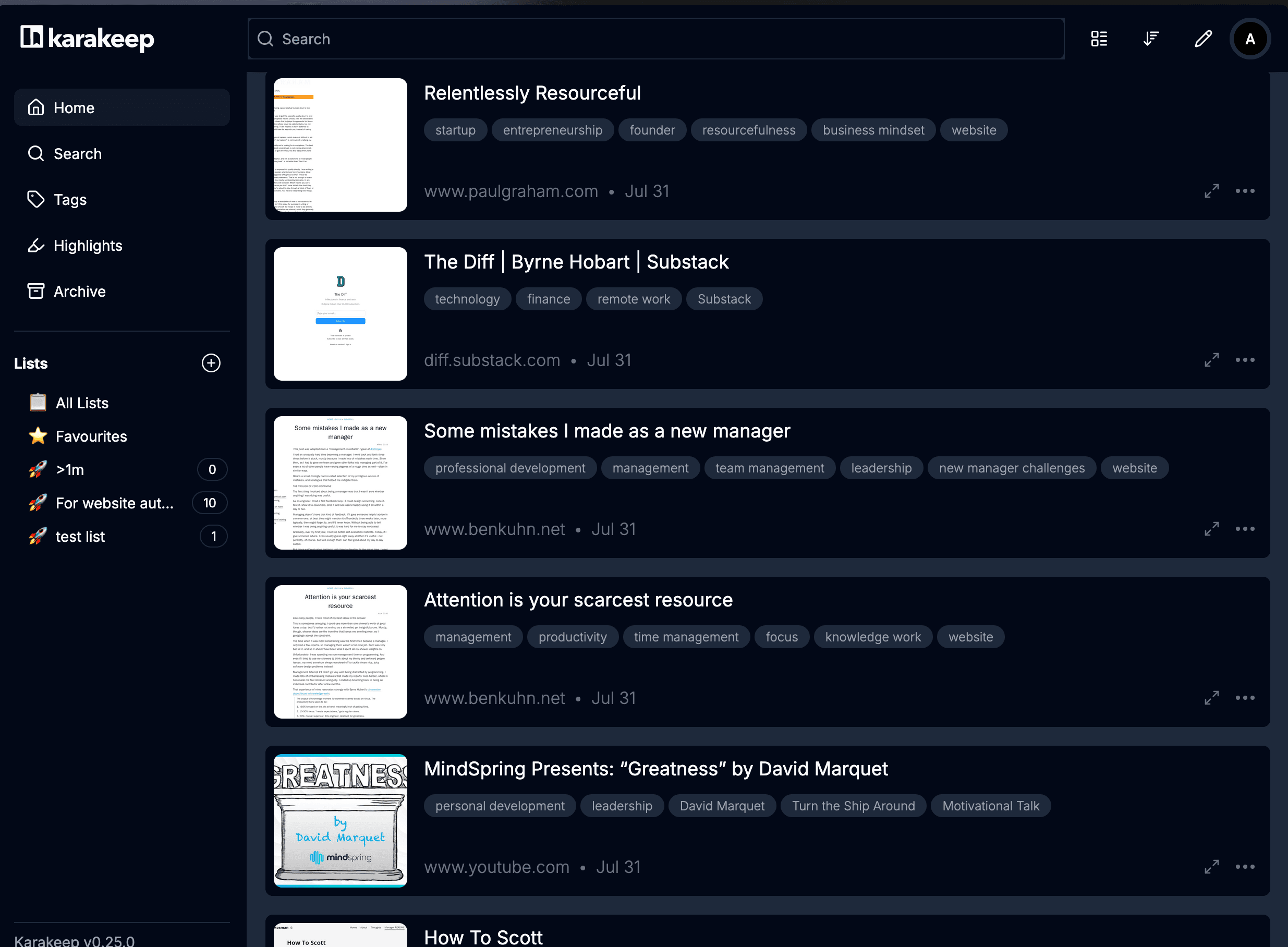Automating My Blog's Weekly Digest with a Self-Hosted API and GitHub Actions
I'm a big believer in automating repetitive tasks. One of my weekly routines was to collate a list of interesting articles I'd bookmarked and share them on my blog. This manual process of copy-pasting links was tedious and error-prone. I knew there had to be a better way. Almost all of code you will see below was vibe-coded in Cursor in around an hour. I had to feed it the API docs, validate the API responses, and de-bug here and there. Overall, I would say that it did 95% of the work for me. It also guided me in creating my first ever GitHub Action.
 Karakeep UI
Karakeep UI
I use a self-hosted instance of Karakeep running on my home server to save and tag articles. The goal was to build a system that could automatically fetch these bookmarks every week and create a new digest post on this Next.js blog.
The Initial Plan and the Serverless Hurdle
My first thought was see if Vercel offered something off the shelf. I looked into Vercel Cron Jobs. I was hoping that this could trigger an API route in my Next.js app every Sunday, to fetch data from the Karakeep API and create a new markdown file. I didn't have to noodle on this for too long, before I realized it wouldn't work.
The Vercel Cron jobs filesystem is read-only. A Next.js API route running on Vercel cannot write a new markdown file to the /_posts directory of my website's Git repo. So I needed a process that could add a new file to the source code itself.
The Solution: Git as a Database, Driven by GitHub Actions
The most robust solution was to treat my Git repository as the database. The workflow would be:
- Run a script on a schedule.
- The script fetches data using the Karakeep API
- A node script generates a new markdown file.
- The script commits this new file back to the repository.
- This new commit triggers a fresh deployment on Vercel (this happens automatically with Vercel's Git-based deployments)
Step 1: The Data-Fetching Script
I created a TypeScript script, scripts/sync-bookmarks.ts, to handle the core logic.
I don't know Typescript so this part was vibe coded in Cursor. I don't know Typescript so this part was vibe coded in Cursor. I don't know Typescript so this part was vibe coded in Cursor. I don't know Typescript so this part was vibe coded in Cursor.
First, it fetches bookmarks from my specific Karakeep list. The script uses dotenv to load credentials from a .env.local file during local development.
const fetchBookmarks = async (): Promise<KarakeepBookmark[]> => {
const requestUrl = `${API_BASE_URL}/api/v1/lists/${LIST_ID}/bookmarks`;
const response = await fetch(requestUrl, {
headers: {
Authorization: `Bearer ${API_KEY}`,
Accept: "application/json",
},
});
// ... error handling ...
const data = (await response.json()) as KarakeepApiResponse;
return data.bookmarks;
};
I don't want to upload all the random stuff I read, so this scipt filters these bookmarks for ones that I explicitly tagged with website.
const filteredBookmarks = allBookmarks.filter((bookmark) =>
bookmark.tags.some((tag) => tag.name.toLowerCase() === "website")
);
Finally, it formats the filtered bookmarks into a single markdown file for the week. The title is generated dynamically with the current date, and the body is a numbered list of links. If a bookmark has a summary, it's included as an indented sub-bullet.
const markdownList = bookmarks
.map((bookmark, index) => {
let markdownItem = `${index + 1}. [${escapedItemTitle}](${itemUrl})`;
if (bookmark.summary) {
markdownItem += `\n - ${bookmark.summary}`;
}
return markdownItem;
})
.join("\n\n");
Step 2: The GitHub Action Workflow
With the script ready, the next step was to automate it. I created a GitHub Actions workflow file at .github/workflows/weekly-digest.yml.
The workflow is configured to run every Sunday at 10 PM EST, with workflow_dispatch added to allow for manual runs from the GitHub UI.
on:
schedule:
- cron: '0 22 * * 0' # Every Sunday at 10 PM EST
workflow_dispatch: {}
The job itself is straightforward:
- Check out the code:
actions/checkout@v4 - Set up Node.js:
actions/setup-node@v4 - Install dependencies:
npm install - Run the script:
npx ts-node scripts/sync-bookmarks.ts. The Karakeep credentials are provided securely via GitHub Actions Secrets, which are mapped to environment variables. - Commit the new file: This is the magic step. I used the
stefanzweifel/git-auto-commit-actionwhich automatically detects if new files were created by the script and, if so, commits them to themainbranch.
Here's the core of the job definition:
jobs:
build-and-commit:
runs-on: ubuntu-latest
steps:
- uses: actions/checkout@v4
- uses: actions/setup-node@v4
with:
node-version: '20'
- name: Install dependencies
run: npm install
- name: Run sync script
env:
KARAKEEP_API_URL: ${{ secrets.KARAKEEP_API_URL }}
KARAKEEP_API_KEY: ${{ secrets.KARAKEEP_API_KEY }}
KARAKEEP_LIST_ID: ${{ secrets.KARAKEEP_LIST_ID }}
run: npx ts-node scripts/sync-bookmarks.ts
- name: Commit and push if changed
uses: stefanzweifel/git-auto-commit-action@v5
with:
commit_message: "chore: weekly digest post for {{date}}"
commit_options: '--no-verify --signoff'
file_pattern: '_posts/*.md'
A Note on ts-node and Next.js
A final hurdle was getting ts-node to work correctly with the Next.js project's TypeScript configuration. The "moduleResolution": "bundler" setting in tsconfig.json is great for Next.js builds but can cause issues for standalone scripts. The fix was to provide a ts-node-specific override in tsconfig.json to use the CommonJS module system for script execution. I'm not sure if this is the best way to do this, but it works.
{
//... compilerOptions
"ts-node": {
"compilerOptions": {
"module": "CommonJS"
}
},
//... include/exclude
}
Final Result
Now, every Sunday, I get a new post on my blog with a list of articles I read during the week. This workflow fetches my bookmarks from Karakeep, creates a new digest post, and commits it. Vercel sees the new commit and triggers a deployment. By the time I wake up, a new "Internet Goodies" post is live on my blog.